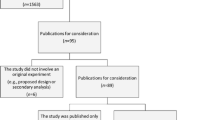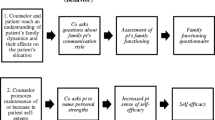Abstract
Outcomes in the field of genetic counseling have not been well-defined or categorized, despite pressures to provide evidence-based measures in all areas of healthcare. This study describes a process to elucidate and categorize a wide-ranging set of outcomes as characterized by diverse groups of practicing genetic counselors. Semi-structured focus groups were conducted at the National Society of Genetic Counselors 2013 NSGC Annual Education Conference during an educational breakout session. A general inductive qualitative research approach was utilized to code focus group notes, categorize them into themes, and compare them across specialty groups. A total of 107 individuals participated in 14 focus groups, consisting of specialists in cancer (n = 20), general genetics (n = 40), prenatal genetics (n = 11), and “other” (n = 36). Of the twelve genetic counseling outcomes themes identified, the most common across focus groups included: 1) appropriateness of testing and accuracy of results interpretation; 2) psychosocial outcomes; 3) adherence to or receipt of appropriate medical management; and 4) patient and provider knowledge. Data assessed by specialty demonstrated similarities in outcomes themes, suggesting that a common set of genetic counseling outcomes would likely be appropriate to cover the majority of needs for the profession. Results can serve as a platform from which to build a more well-defined and comprehensive set of outcomes.
Similar content being viewed by others
References
Baldwin, E. E., Boudreault, P., Fox, M., Sinsheimer, J. S., & Palmer, C. G. S. (2012). Effect of pre-test genetic counseling for deaf adults on knowledge of genetic testing. Journal of Genetic Counseling, 21, 256–272. doi:10.1007/s10897-011-9398-1.
Berkenstadt, M., Shiloh, S., Barkai, G., Katznelson, M. B. M., & Goldman, B. (1999). Perceived Personal Control (PPC): A new Concept in Measuring Outcome of Genetic Counseling. American Journal of Medical Genetics, 82, 53–59. doi:10.1002/(SICI)1096-8628(19990101)82:1<53::AID-AJMG11<3.0.CO;2-#.
Burke, W., Culver, J. O., Bowen, D., Lowry, D., Durfy, S., McTiernan, A., & Andersen, M. R. (2000). Genetic counseling for women with an intermediate family history of breast cancer. American Journal of Medical Genetics, 90, 361–368. doi:10.1002/(SICI)1096-8628(20000228)90:5<361::AID-AJMG4>3.0.CO;2-8.
Burwell, S. (2015). Setting Value-Based Payment Goals — HHS Efforts to Improve U.S. Health Care. The New England Journal of Medicine, epub, 1–3. doi:10.1056/NEJMp1500445
Cabrera, E., Blanco, I., Yagüe, C., & Zabalegui, A. (2010). The impact of genetic counseling on knowledge and emotional responses in spanish population with family history of breast cancer. Patient Education and Counseling, 78, 382–388. doi:10.1016/j.pec.2009.10.032.
Clarke, A., Parsons, E., & Williams, A. (1996). Outcomes and process in genetic counselling. Clinical Genetics, 50, 462–469.
Cragun, D., Camperlengo, L., Robinson, E., Caldwell, M., Kim, J., Phelan, C., et al. (2014). Differences in BRCA counseling and testing practices based on ordering provider type. Genetics in Medicine: Official Journal of the American College of Medical Genetics. doi:10.1038/gim.2014.75.
DeMarco, T. A., Peshkin, B. N., Mars, B. D., & Tercyak, K. P. (2004). Patient satisfaction with cancer genetic counseling: a psychometric analysis of the genetic counseling satisfaction scale. Journal of Genetic Counseling, 13, 293–304. doi:10.1023/B:JOGC.0000035523.96133.bc.
Elliott, A. M., Chodirker, B. N., Bocangel, P., & Mhanni, A. A. (2014). Evaluation of a Clinical Genetics Service - A Quality Initiative. Journal of Genetic Counseling. doi:10.1007/s10897-014-9713-8.
Forum, N. Q. (2010). Preferred practices and performance measures for measuring and reporting care coordination: a consensus report. Washington D.C.
Grant, R. W., O’Brien, K. E., Waxler, J. L., Vassy, J. L., Delahanty, L. M., Bissett, L. G., et al. (2013). Personalized genetic risk counseling to motivate diabetes prevention: a randomized trial. Diabetes Care, 36, 13–19. doi:10.2337/dc12-0884.
Hamilton, J. G., Lobel, M., & Moyer, A. (2009). Emotional distress following genetic testing for hereditary breast and ovarian cancer: a meta-analytic review. Health Psychology: Official Journal of the Division of Health Psychology, American Psychological Association, 28, 510–518. doi:10.1037/a0014778.
Hunter, A. G. W., Cappelli, M., Humphreys, L., Allanson, J. E., Chiu, T. T., Peeters, C., et al. (2005). A randomized trial comparing alternative approaches to prenatal diagnosis counseling in advanced maternal age patients. Clinical Genetics, 67. doi:10.1111/j.1399-0004.2004.00405.x.
Inglis, A., Koehn, D., McGillivray, B., Stewart, S. E., & Austin, J. (2014). evaluating a unique, specialist psychiatric genetic counseling clinic: uptake and impact. Clinical Genetics, 1–7. doi:10.1111/cge.12415.
Kasparian, N. A., Wakefield, C. E., & Meiser, B. (2007). Assessment of psychosocial outcomes in genetic counseling research: an overview of available measurement scales. Journal of Genetic Counseling. doi:10.1007/s10897-007-9111-6.
Keller, M., Jost, R., Haunstetter, C. M., Sattel, H., Schroeter, C., Bertsch, U., et al. (2008). Psychosocial outcome following genetic risk counselling for familial colorectal cancer. A comparison of affected patients and family members. Clinical Genetics, 74, 414–424. doi:10.1111/j.1399-0004.2008.01089.x.
Kishnani, P. S., Steiner, R. D., Bali, D., Berger, K., Byrne, B. J., Case, L. E., et al. (2006). pompe disease diagnosis and management guideline. Genetics in Medicine: Official Journal of the American College of Medical Genetics, 8, 267–288. doi:10.1097/01.gim.0000218152.87434.f3.
Laney, D. A., Bennett, R. L., Clarke, V., Fox, A., Hopkin, R. J., Johnson, J., et al. (2013). Fabry disease practice guidelines: recommendations of the national society of genetic counselors. Journal of Genetic Counseling, 22, 555–564. doi:10.1007/s10897-013-9613-3.
Mcallister, M., Wood, A., Dunn, G., Shiloh, S., & Todd, C. (2011). The genetic counseling outcome scale: a new patient-reported outcome measure for clinical genetics services. Clinical Genetics, 79, 413–424. doi:10.1111/j.1399-0004.2011.01636.x.
Miller, C. E., Krautscheid, P., Baldwin, E. E., Tvrdik, T., Openshaw, A. S., Hart, K., & Lagrave, D. (2014). Genetic counselor review of genetic test orders in a reference laboratory reduces unnecessary testing. American Journal of Medical Genetics, Part A, 164, 1094–1101. doi:10.1002/ajmg.a.36453.
Patton, M. Q. (2002). Qualitative Evaluation and Research Methods. Research in Nursing & Health (3rd ed., Vol. 14). Thousand Oaks: SAGE Publications, Inc.
Pieterse, A. H., Van Dulmen, A. M., Beemer, F. A., Bensing, J. M., & Ausems, M. G. E. M. (2007). Cancer genetic counseling: communication and counselees’ post-visit satisfaction, cognitions, anxiety, and needs fulfillment. Journal of Genetic Counseling, 16, 85–96. doi:10.1007/s10897-006-9048-1.
Proctor, E. K., Landsverk, J., Aarons, G., Chambers, D., Glisson, C., & Mittman, B. (2009). Implementation research in mental health services: an emerging science with conceptual, methodological, and training challenges. Administration and Policy in Mental Health and Mental Health Services Research, 36, 24–34. doi:10.1007/s10488-008-0197-4.
Proctor, E., Silmere, H., Raghavan, R., Hovmand, P., Aarons, G., Bunger, A., Griffey, R., Hensley, M. (2011). Outcomes for implementation research: conceptual distinctions, measurement challenges, and research agenda. Administration and Policy in Mental Health and Mental Health Services Research, 38(2), 65–76.
Randall, J., Butow, P., Kirk, J., & Tucker, K. (2001). Psychological impact of genetic counselling and testing in women previously diagnosed with breast cancer. Internal Medicine Journal, 31(7), 397–405.
Rutherford, S., Zhang, X., Atzinger, C., Ruschman, J., & Myers, M. F. (2014). Medical management adherence as an outcome of genetic counseling in a pediatric setting. Genetics in Medicine: Official Journal of the American College of Medical Genetics, 16, 157–163. doi:10.1038/gim.2013.90.
Schaefer, G. B., & Mendelsohn, N. J. (2008). Clinical genetics evaluation in identifying the etiology of autism spectrum disorders. Genetics in Medicine: Official Journal of the American College of Medical Genetics, 10, 301–305. doi:10.1097/GIM.0b013e31816b5cc9.
Schneider, K. I., & Schmidtke, J. (2014). Patient compliance based on genetic medicine: a literature review. Journal of Community Genetics, 5, 31–48. doi:10.1007/s12687-013-0160-2.
Strauss, M. E., & Smith, G. T. (2009). Construct validity: advances in theory and methodology. Annual Review of Clinical Psychology, 5, 1–25. doi:10.1146/annurev.clinpsy.032408.153639.
Taylor, J. Y., & Wu, C. Y. (2009). Effects of genetic counseling for hypertension on changes in lifestyle behaviors among African-American Women. Journal of National Black Nurses’ Association: JNBNA, 20, 1–10.
Thomas, D. R. (2006). A general inductive approach for analyzing qualitative evaluation data. American Journal of Evaluation, 27(2), 237–246. doi:10.1177/1098214005283748.
Institute of Medicine (US) Committee on Standards for Developing Trustworthy Clinical Practice Guidelines. (2011) In. R. Graham, M. Mancher, D. Miller Wolman, S. Greenfield, & E. Steinberg (Ed.), Washington, DC: National Academies Press.
Tuckson, R. V. (2009). Challenges and opportunities for evidence-based genetics practice. Genetics in Medicine: Official Journal of the American College of Medical Genetics, 11, 1–2. doi:10.1097/GIM.0b013e31819251b2.
Vos, J., Otten, W., van Asperen, C., Jansen, A., Menko, F., & Tibben, A. (2008). The counsellees’ view of an unclassified variant in BRCA1/2: recall, interpretation, and impact on life. Psycho-Oncology, 17, 822–830. doi:10.1002/pon.1311.
Zellerino, B., Milligan, S. A., Brooks, R., Freedenberg, D. L., Collingridge, D. S., & Williams, M. S. (2009). Development, testing, and validation of a patient satisfaction questionnaire for use in the clinical genetics setting. American Journal of Medical Genetics, Part C: Seminars in Medical Genetics, 151, 191–199. doi:10.1002/ajmg.c.30214.
Acknowledgments
We would like to thank the NSGC Genetic Counseling Working Group members for their feedback throughout the process and the participants for their expertise and input.
Partial support for Deborah Cragun’s time was provided by a NCI R25 training grant awarded to Moffitt Cancer Center (R25CA147832-05). This work was also influenced by Deborah Cragun’s participation in the Mentored Training in Dissemination and Implementation Research in Cancer (MT-DIRC) program. MT-DIRC is supported through a NCI grant (R25CA171994-02) and by the Veterans Administration (VA).
Author information
Authors and Affiliations
Corresponding author
Ethics declarations
Conflict of Interest
H. A. Zierhut, K. M. Shannon, D.L. Cragun and S.A. Cohen declare that they have no conflict of interest.
Human Studies and Informed Consent
All procedures followed were in accordance with the ethical standards of the responsible committee on human experimentation (institutional and national) and with the Helsinki Declaration of 1975, as revised in 2000 (5). Informed consent was obtained from all patients for being included in the study. No animal studies were carried out by the authors for this article.
Rights and permissions
About this article
Cite this article
Zierhut, H.A., Shannon, K.M., Cragun, D.L. et al. Elucidating Genetic Counseling Outcomes from the Perspective of Genetic Counselors. J Genet Counsel 25, 993–1001 (2016). https://doi.org/10.1007/s10897-015-9930-9
Received:
Accepted:
Published:
Issue Date:
DOI: https://doi.org/10.1007/s10897-015-9930-9




